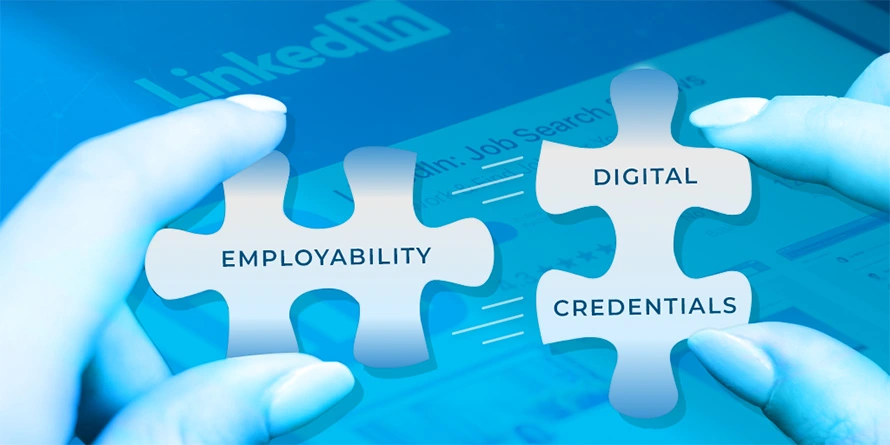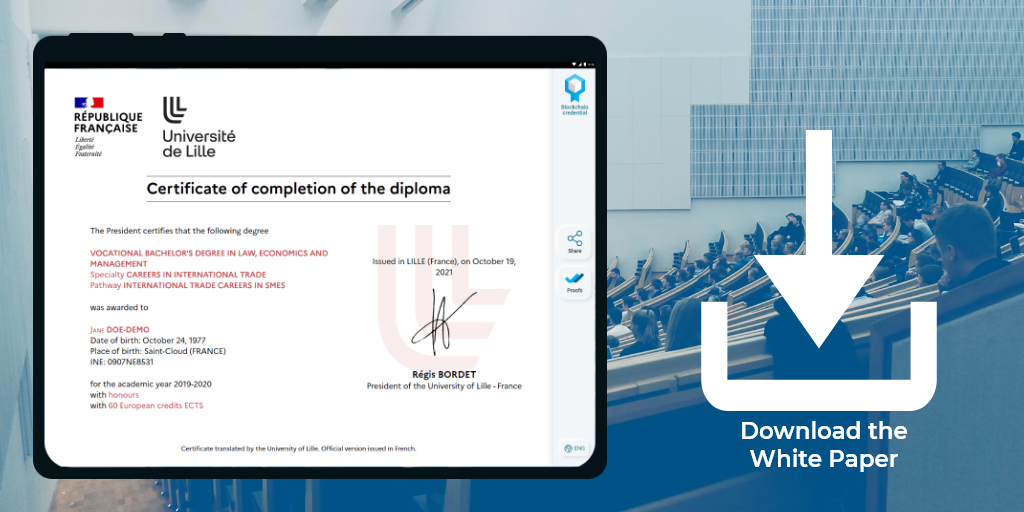Digital Credentials represent a significant leap in academic certification, providing a digital alternative to traditional titles, diplomas, or certificates. Enhanced by blockchain technology, these credentials are verifiable, ensuring their integrity and safeguarding against falsification. The term “Verifiable Credentials” aptly describes this new secure format.
Adopting digital credentials is crucial for universities, as evidenced by the initiatives like the Digital Credentials Consortium and Europe’s EBSI-VECTOR project. Globally, few universities have successfully implemented large-scale automated deployment of digital credentials. This article showcases the University of Lille, one of France’s largest public universities, as a pioneering example in this domain.
To celebrate the release of the 2023 edition of the White Paper “Implementation of Digital Credentials at University of Lille – France”, we are introducing a project named Dem-Attest, short for “dematerialized attestations”.
Objectives of the University of Lille Digital Credential Project
The objective is to create a digital version of all diplomas and attestations in the form of tamper-proof, bilingual, and lifelong-valid digital credentials. For this purpose, blockchain technology has been chosen. The project is “user-oriented”: it aims to provide better service to students, while making the work of academic services more reliable and automated.
“The University of Lille had the opportunity to address the digital transformation of the diploma to reinvent this ‘parchment’, in line with the White Paper of the Digital Credentials Consortium. The Dem-Attest (DEMaterialized ATTestations) project aims to digitize the issuance process for the “certificate of completion of diploma”, previously issued in PDF format via the Student Information System “APOGEE” says Perrine de Coëtlogon, University of Lille, President of the Board of Open Education Global.
“The Dem-Attest project aims to streamline the diploma issuance process through innovation by involving all actors in the management of results. This project has garnered strong internal support as it combines organizational, technical, and regulatory dimensions. It focuses on establishing high-quality services for students, enabling them to quickly obtain proof of their qualifications while reducing the workload for teams” adds Imane Chaabi, Deputy Director of Academic Services at the University of Lille.
Key Figures
- 1 A single data model was used to automate the issuance process for all of the University’s diplomas.
- 2 Certificates are available in two languages: French and English, thanks to the translation work of the University’s course offerings.
- 56 000 More than 56,000 blockchain credentials have been issued to the University’s students.
- 132 000 The certificates have been viewed and verified online more than 132,000 times…
- 140 … from over 140 countries across all 5 continents.
Testimonial from the Law Department
The Faculty was involved in the project from the outset in 2021, serving as a pilot component. It tested and validated all deployments, eventually fully integrating the issuance of digital attestations into its processes by 2023, replacing the PDF format previously used in the SIS.
“In the beginning, I had reservations about whether the academic services teams would adapt to the tool… but the opposite happened: they embraced the challenge and now autonomously issue attestations in real-time. The time saved is nearly half a day for a cohort of 400 graduates, as a single click in the application is all it takes” says Tony Delettrez, Deputy Director of Support Services, Faculty of Legal, Political, and Social Sciences.
Student Testimonial

We were fortunate to gather a testimonial from Abdoulmajid Moustapha, a graduate of the University of Lille:
“Thanks to digital credentials, my degree is more secure, and its value is preserved! No more need to share a falsifiable PDF or a paper diploma that could get lost: digital credential certificates are emailed to students and contain all the information beneficial for their employability. While physical diplomas and digital credentials aim for the same goal, certified digital attestations provide a more detailed explanation.” For Abdoulmajid Moustapha, this technology represents the future for international universities and should be carefully considered by governments struggling to combat the falsification of official documents.
The full interview can be accessed here:
The European Context
“The University of Lille, BCdiploma, and Visions are members of the European EBSI-VECTOR project. The Dem-Attest project fits into this European dimension, which will allow the sharing of diplomas, skills, or open badges in a European ‘e-wallet’. The EBSI-VECTOR project (EBSI enabled VErifiable Credentials and Trusted Organisations Registries) places self-sovereign identity and its ‘digital wallets’ at the heart of a paradigm shift in computer services for public education (and social security) systems, with 56 partners from 20 EU member states” explains Perrine de Coëtlogon, University of Lille, President of the Board of Open Education Global.
Further Insights
The White Paper covers various aspects of the Dem-Attest project, such as the choice of blockchain technology, energy consumption considerations, design of attestations, student and recruiter documentation, data privacy in compliance with GDPR, and the integration and data flow processes:
- An initiative by the Academic Affairs Department
- Example of a blockchain attestation
- Why choose blockchain technology?
- What about energy consumption?
- Design of the attestations
- Distribution of attestations to students
- Documentation for students
- Documentation for recruiters
- Experience feedback: Legal Component
- Data rights and GDPR compliance
- Integration and data flow
- Dem-Attest and the EBSI-VECTOR project
